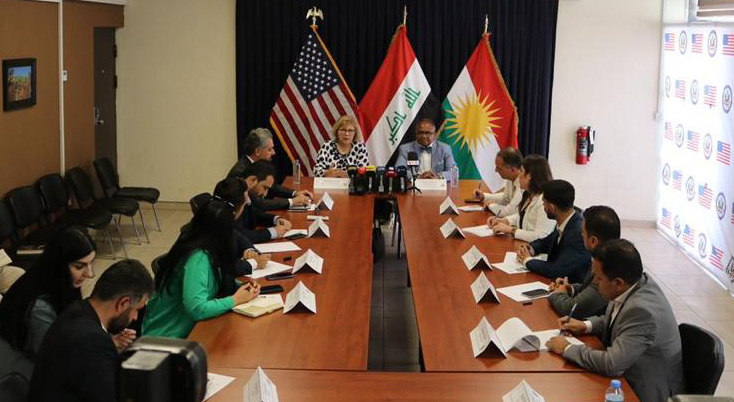A senior American official says compromise is the essence of amending the Iraqi constitution so that no one is marginalized.
US Assistant Secretary of State for Near East Affairs Barbara Leaf's remarks came at a press conference held following a meeting with representatives of a number of media outlets, including Salam Omar, editor-in-chief of KirkukNow, on Thursday September 8, 2022, in Erbil, capital of the Iraqi Kurdistan Region IKR, in the presence of US Consul General Irvin Hicks.
Omar asked the US views on the demands of some of the Iraqi political parties to amend the constitution, which is related to Article 140 which stipulates the roadmap for the disputed territories between Baghdad and Erbil and the threats to the future of religious freedom faced by minorities.
Resolving the issue of the disputed territories is very important
"The only thing more difficult than amending the constitution is writing it," leaf said. "The Americans are the best evidence in this regard, because writing the constitution in the 18th century was very difficult.”
"Of course, amending the constitution is a difficult task, because it’s tougher than anything and it’s the work of compromise so that no one feels marginalized or punished because of the changes, so resolving the issue of conflict areas is very important," she said.
The call for constitutional amendments has been lately obvious in statements by officials of Iraq's conflicting political parties yet no practical steps have been taken.
In mid-May, former ambassador of the United States of America USA to Iraq Matthew Tueller said during farewell meeting with a group of journalists in Erbil, the issue of armed groups and militias in the disputed territories and particularly in Shingal (Sinjar), home to the Ezidi community, requires “a very wise political handling of the issues when you have groups become so entrenched within the economic and security institutions and have their own weapons.”
Video: part of the press conference by US Assistant Secretary of State Barbara Leaf in Erbil, on September 8, 2022.
Leaf affirmed that she has been following events in Iraq for nearly 20 years as she lived in Basra in 2010 and then worked in Washington for several years.
“I am surprised that many sensitive issues have not been resolved yet. For example, the oil and gas law, which regulates energy issues between Erbil and Baghdad, has been discussed for nearly 15 years.”
According to the Iraqi constitution, endorsed in 2005, a law should have been passed to manage the oil and gas issue, but due to political disagreements, especially between the two federal governments and the Kurdistan Regional Government KRG, the law has not been ratified up to the present.
"The issue of the conflict areas and the communities living there and are in danger must be resolved.”
I am surprised so many sensitive issues have not been resolved yet
According to the Iraqi constitution, the fate of the administration of Kirkuk and other disputed territories between the two federal governments and the KRG is linked to the implementation of Article 140, which consists of three main stages: normalization, census and referendum.
Regarding the dangers of amending the constitution; "It is a difficult task and requires the efforts of women and men of will, who unfortunately do not have many women working on these issues, who have the political courage and at the same time compromise so that all Iraqis regardless of ethnic and religious communities live equally and fairly, and that's still being worked on here.”
Leaf, referring to her trip to Iraq including the IKR, where she met with a number of religious figures, reaffirmed US support for issues affecting minorities, so that they can live in their communities without pressure from other forces. where there is mutual acceptance.
"One of the most distinctive features of life in the Kurdistan Region is that it follows the principle of 'live and let others live' with regard to different religious communities."





